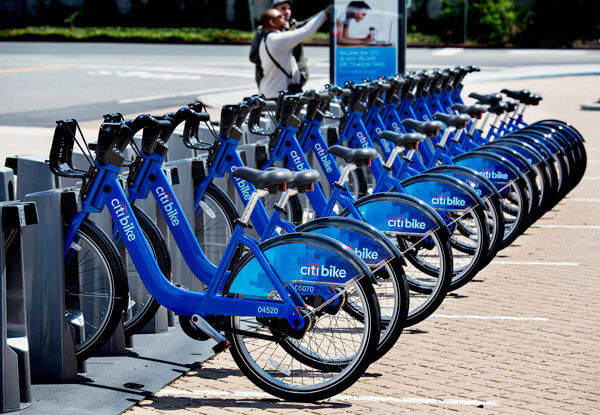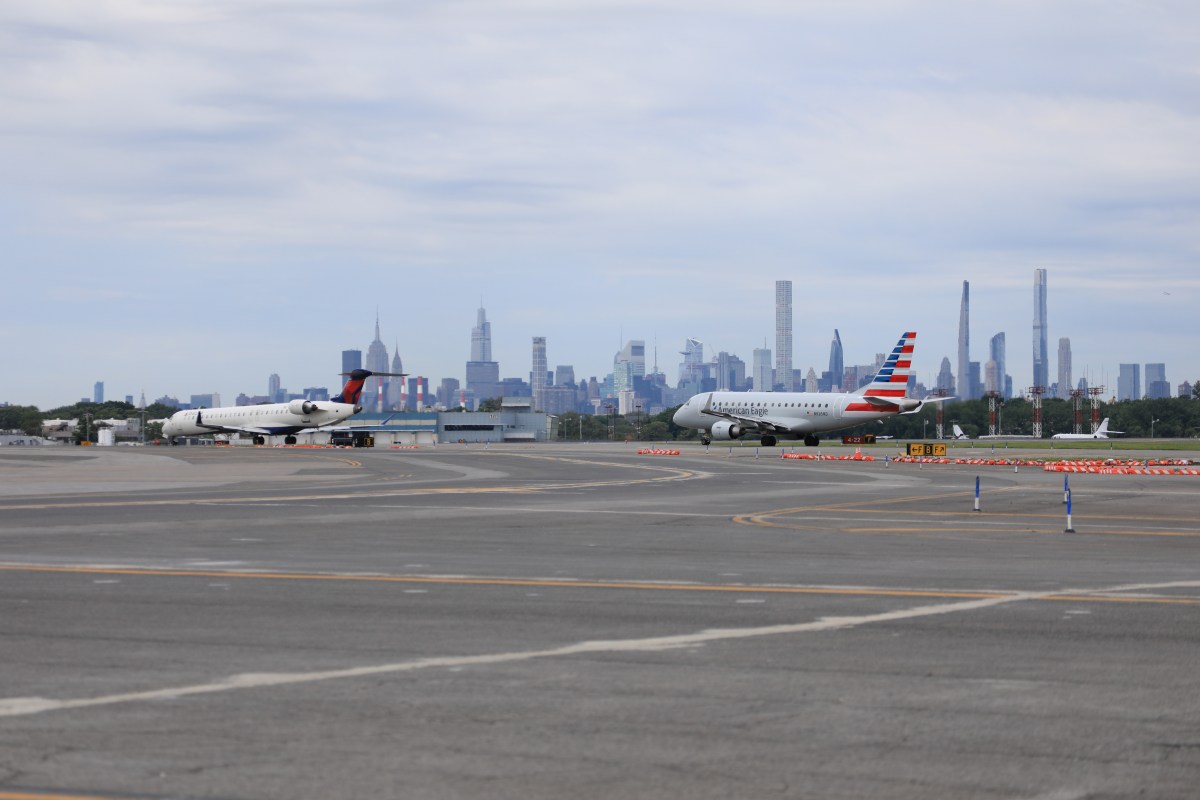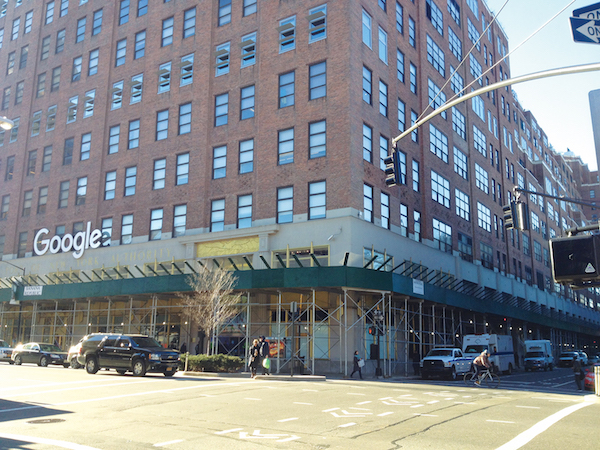
BY SEAN EGAN | It’s something that’s becoming a frequent, if not common, occurrence across the city: the abuse of After Hours Variances (AHVs), to the detriment of residents forced to essentially live near construction sites that are active at all hours of the day. This time, the source of the problem is, arguably, Chelsea’s most powerful resident — and, indeed, one of the most powerful entities in the world.
Located between Eighth and Ninth Aves., and W. 15th and W. 16th Sts., the Google Building (111 Eighth Ave.) has been abuzz with ear-splitting activity, late into the night and through the early morning hours.
A neighbor of the Google Building, Daniel (who requested his last name be withheld) brought the issue to the attention of Chelsea Now in mid-December, via email. A resident of 305 W. 16th St. (adjacent to the Google Building), he began to notice the noise being emitted from the building after removing his AC unit.
The source of the disturbance was a number of large trucks, situated in the building’s loading docks (right outside Daniel’s apartment), which were being used to get rid of debris from the 10th floor (such as metal rods and pipes). Some of the trucks also had motorized compactors to crush the debris at the site, further exacerbating the level of noise.
Daniel believes the source of this problem is the site’s AHV — a permit that allows construction to happen at a site after normal working hours (such as nights and weekends), ostensibly because the work wouldn’t be possible (or unadvisable due to safety concerns) during regular times. The AHV for 111 Eighth Ave., which is granted by the Department of Buildings (DOB), allows for construction to go on until 2 a.m. on weekdays, as well as from 7 a.m. to 7 p.m. on Saturdays, in order to allow access to the building’s elevators that wouldn’t be possible during normal work hours.
In addition, the AHV form indicates that “all work [is] being done within an enclosed building.” And while most of the construction is indeed taking place indoors, the loading docks open out into the street, and remain so throughout construction — meaning the noise from the trucks is not at all mitigated. In addition, trucks often spill out from the docks and onto the street proper — all of which does not exactly align with the term “enclosed.”
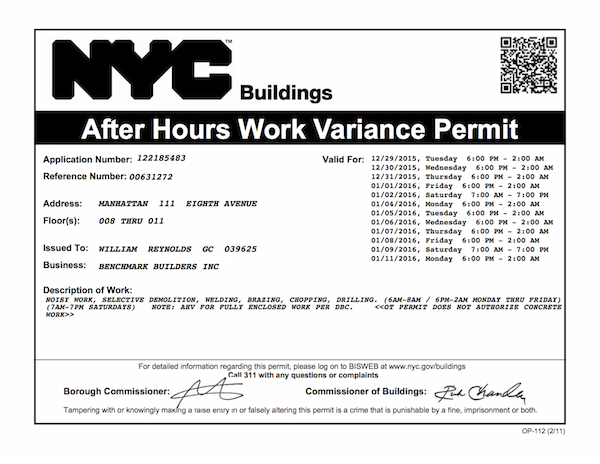
Daniel shared with Chelsea Now a video of such an occurrence, depicting construction taking place at 11:30 p.m. near the loading docks. It clearly shows one truck, parked on the street just outside the docks, making a racket as debris is thrown in and compressed. Daniel, who complained about such incidents in early November, also claims that, aside from a handful of days, the work occurred every night for the three months prior to mid-December. One of the days when the work did not occur, he notes, was Dec. 16, the night when DOB reps came to check out the property — something he suspects was too coincidental to be an accident.
Furthermore, the AHV for the work has been renewed through at least Jan. 11 — just as it has been renewed on a near-weekly basis since the spring of 2015.
“It’s not reasonable for them to have rubber stamped AHVs given to them every week, in perpetuity until two in the morning,” said Daniel of the AHVs, which the DOB has been granting far more frequently city-wide recently, as Chelsea Now has previously reported. “And even if work is to end at 11 or 11:30 [p.m.], that work is still extremely disturbing to neighbors, especially those who need to wake up earlier in the day to get to work.” (Daniel’s job requires him to be awake at 5 a.m.)
To try to remedy the problem, Daniel reached out to the office of Councilmember Corey Johnson, after using avenues such as 311 (along with other tenants) and trying to talk to the DOB and representatives from Taconic Management, LLC (which manages the Google Building) yielded no tangible results. Through the efforts of Johnson’s office, John Waldman of the DOB reached out to Benchmark Builders, the contractor doing the work, to address the complaints.
A response letter from Benchmark to Waldman states that “the substantial demolition activities that were generating the excessive amounts of debris [the 10th floor project] were completed approximately 11/23/15,” and that garbage removal only occurs about twice a week from 6:30 p.m. to 8:30 p.m. Daniel challenges these claims, saying the trash removal work is regularly conducted far later than 8:30 p.m. — and that while the 10th floor may be completed, there’s work plans for the building well into 2016, and their noise had been disturbing beyond Nov. 23.
For their part, Taconic stated they were unaware of any issues related to the site more recent than the November complaints. Chris MacArthur, Senior Property Manager of 111 Eighth Ave. for Taconic, told Chelsea Now that following the complaints in November, they moved up the time when the debris removal began, and reiterated that the 10th floor project was completed around Nov. 23. He also stated that while there is still work going on in building, he was unaware of the other interior work that was causing noise disturbances, or any other complaints beyond the November work.
He also noted that Taconic itself was not the entity that filed for the permits and paperwork for the job, including the AHV. That fell on the contractor doing the work, Benchmark Builders. The most recent AHV renewals for the site corroborate this claim. Furthermore, Corey Johnson’s office has had contact with Taconic in hopes of remedying the situation.
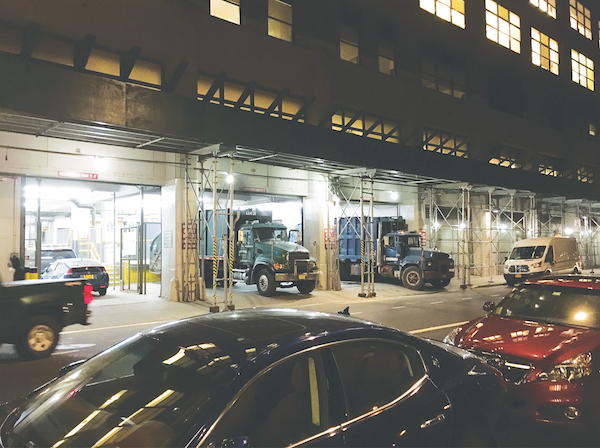
“It’s a big building and there’s a lot they have to manage,” Daniel conceded of Taconic, “but there’s a certain level of courtesy and care that should be taken, especially in Chelsea.” He also decried the DOB for giving out permits carelessly in the first place, and noted the “city doesn’t have really good control over what’s going on.”
In a statement on the situation, Councilmember Corey Johnson said: “Residents have a right to the quiet enjoyment of their homes. Construction work should not take place in the evening, and exceptions should be made only in special circumstances, when it is unavoidable. I’m encouraged that the management of 111 Eighth Avenue has agreed to curtail the days and hours that work takes place, and I look forward to working with them and the building’s neighbors to ensure that this happens.”
While it’s heartening that it seems progress is being made on the issue, the situation boils down to this: For a few months, the terms of the AHV and the meaning of “enclosed building” have been interpreted quite liberally by the contractor — and the DOB, as well as the building managers, did not address the issue sufficiently while the work continued. The ones suffering are those who live in the surrounding area, forced to listen to construction noise. To Daniel, and indeed many across the city, it’s an upsetting trend.
“It’s such an incredible city and an incredible neighborhood with a lot of history that has really good quality of life for its residents,” Daniel observed, lamenting that it may “become severely deteriorated because of these rubber stamp permits that are being issued, without the care, and then lack of consideration for their neighbors.”



